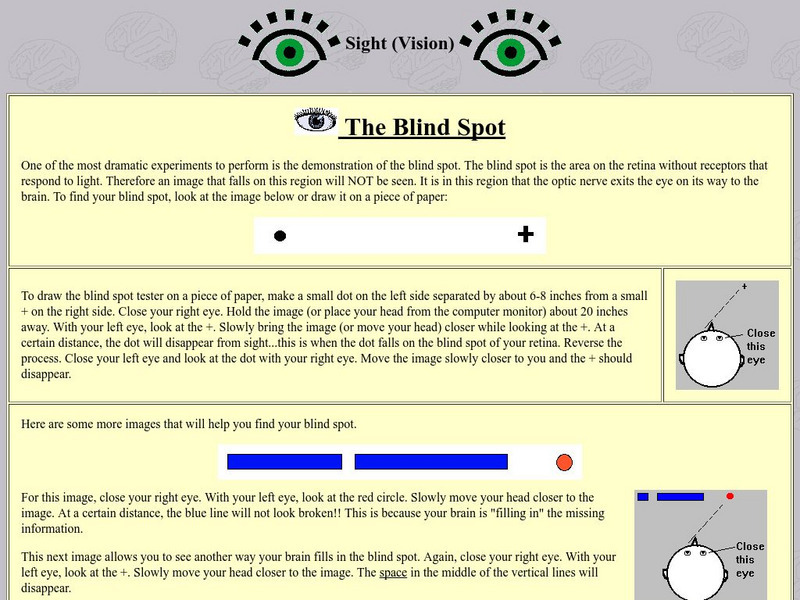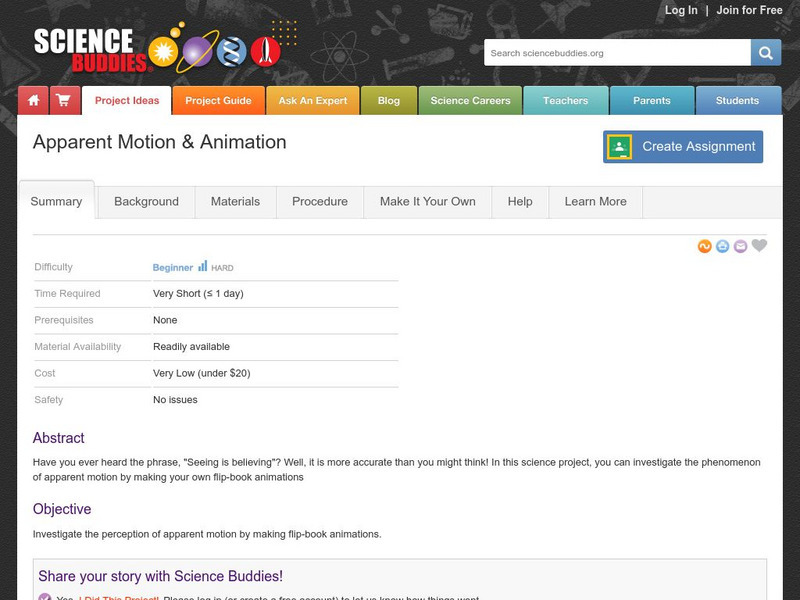Hi, what do you want to do?
Exploratorium
Jacques Cousteau in Seashells
Visionaries create images out of dots to demonstrate the eye-brain connection. Through this activity, they learn that the brain interprets data collected by the eye into recognizable information. Search online for "Jacques Cousteau in...
Exploratorium
Squirming Palm
You will need an electric drill and some Velcro™ in order to have this activity available for your class. It is, however, an intriguing display of optical illusion. After watching a spinning disk (provided), viewers look at one of...
Exploratorium
Bird in the Cage
When your life science class is learning about the eye and how it works, you can add this activity as a demonstration of how the retina holds an afterimage. After staring at a red, green, or blue bird shape, pupils glance at a cage and...
Exploratorium
Fading Dot
Fuzzy edges cause an image to fade from view in an activity intended to demonstrate how vision works.
Exploratorium
Depth Spinner
Put a new twist on your collection of optical illusion activities. Affix the linked printable spiral to a drill, record player, or some other rotating tool. Have learners stare at the spinning disk for only 15 seconds and then look away....
Curated OER
Studying our Senses
Who would not want an opportunity to taste jellybeans in class? During this investigation, life science learners hold their noses as they take a taste test and find that our perception of flavor is connected with our sense of...
Curated OER
Optical Delusion
Students examine and create a tool that enables them to explore the scientific principle the Moire Effect. Using markers, paper, and scissors, they create an optical illusion that involves superimposing a grid of lines over another...
Curated OER
Geometric Optic Spinner
Learners investigate the concept of an optical illusion and how they are used. They conduct an information search of how the eye works. The information is used in order to set the context upon the creation of a personal optical illusion.
Curated OER
Benham's Disk
Seeing is believing! Or is it? With this simple experiment, young scientists can explore the concept of visual perception. Attach Benham's disk to a rotating appliance such as a hand drill; As it spins, the black lines appear to be...
Curated OER
Vasarely Was A Colorful Fellow
Eighth graders create artwork inspired by the work of Victor Vasarely. In this op art lesson, 8th graders explore color theory and color mixing. Students create ten shapes to use in their artwork and over the course of two weeks,...
Curated OER
The Components of Light
Middle schoolers are given a mnemonic device to review the light spectrum as it relates to the different components of refracted light. In this components of light lesson, students read Light Magic and review the properties of light....
Curated OER
Optical Illusion Vase
Students draw an optical illusion. In this optical illusion lesson plan, students create the optical illusion vase. Students draw a profile and repeat the drawing in reverse creating the vase image.
Curated OER
Fraggle Monster Vase
Students create an optical illusion. In this optical illusions lesson, students sketch a monster's face to create the optical illusion of a vase in the positive space. Students create an original piece of art.
Curated OER
An Awareness of Light Made Simply Fun
Learners with sensory perception issues discover the properties of light through a series of excellent hands on activities. They look at beams of lights in a darkened room; use a kaleidoscope and optical illusions as they experience the...
Curated OER
What is Retrograde Motion
For this retrograde motion worksheet, students draw a diagram of the night sky by connecting dots to show retrograde motion. They compare retrograde motion to an optical illusion and answer questions about both.
Nemours KidsHealth
Handout: Vision (PreK to Grade 2)
For this human body worksheet, students participate in a vision exercise in which they stare at a green, black, and yellow American flag for 20 seconds. Then, students look at a blank sheet of white paper and record what they see.
Curated OER
A Change of Scene
Students are challenged to create optical illusions using using cut-outs. The activity provokes thoughtful discussion about scale.
University of Washington
Neuroscience for Kids: Vision and Optical Illusions
Wow! A great page full of different experiments to illustrate the phenomena of optical illusions, and then it explains what is happening!
Science Buddies
Science Buddies: Apparent Motion & Animation
This project investigates the phenomenon of apparent motion by making your own flip-book animations. This optical illusion experiment, while fun and short, will prove to be a very eye opening experience.
Other
Ritsumeikan University: Akiyoshi's Illusion Pages
A large collection of visual illusions and anomalous motion illusions. The latter can potentially make a person feel dizzy and should be viewed or shared with caution.
Other
Color Matters
Students learn to understand color from a variety of perspectives: physiology, psychology, philosophy, and art.
Hanover College
Hanover College: Use of Visual Information in Art
This site from Hanover College gives a tutorial on issues of visual representation, such as depth, perspective, texture, shadow, illusion. Begins at an introductory level. Numerous pictures.
Optical Society
Optical Society of America: Exploring the Science of Light: Optical Illusions
Explains what optical illusions are and offers many examples to try.
Alabama Learning Exchange
Alex: Perfect Perception? (Perception and Illusion)
In this lesson, students discuss and explore perception and illusions. Websites are provided showing various optical illusions. Students are asked to journal about illusions, recreate illusions, and create their own flip-book.




























